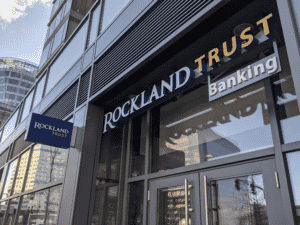As more banks reduce or eliminate overdraft and nonsufficient funds fees, Rockland Trust Co. has taken steps to evaluate the future of these fees for their customers.
Chief Operating Officer Rob Cozzone said in response to an analyst’s question during the bank’s first-quarter earnings call on Friday that Rockland Trust had hired a consultant to evaluate its overdraft and nonsufficient fee programs.
“Of course, we recognize the dynamics that are happening both from a regulatory perspective, as well as now, and even more so now, a competitive perspective,” Cozzone said.
Rockland Trust’s overdraft, nonsufficient funds and uncollected fees for the first quarter totaled more than $4 million, Cozzone said. About 80 percent of that fee income involved consumers, while the rest affected business customers.
Including the overdraft and nonsufficient funds fees, Rockland Trust had first-quarter noninterest income of $26.27 million, down from $29.18 million in the fourth quarter of 2021.
Rockland Trust’s total net income for the first quarter was $53.1 million, or $1.12 per diluted share, compared to net income of $1.7 million, or $0.04 per diluted share, in the fourth quarter of 2021.
The bank said in its earnings statement that first-quarter financial results included pre-tax merger-related costs of $7.1 million associated with the acquisition of East Boston Savings Bank and its parent company, Meridian Bancorp Inc. Merger-related costs in the fourth quarter had totaled $37.2 million.
Recent months have seen several national banks reduce or eliminate overdraft and nonsufficient funds fees that affect low- and moderate-income consumers. Last week, Cape Cod 5 announced plans to eliminate these fees. Rockland Trust’s footprint includes Cape Cod and the Islands.
The consultant working with Rockland Trust will look at the fee programs and the bank’s checking account products, Cozzone said. While he said any changes to fee income would be speculative at this point, Cozzone added that the bank expected to have more information during its second-quarter earnings call.
“Safe to say, we should expect fees to go down,” he said.
Rockland Trust had total assets of $20.2 billion at the end of the first quarter, down 1.3 percent from Dec. 31. Assets increased by $6.4 billion, or 46.4 percent, year-over-year, reflecting the acquisition of East Boston Savings Bank,
The bank’s total loans were $13.6 billion at the end of the first quarter, roughly the same as the end of the fourth quarter. Organic loan growth was partly driven by line utilization increases within the commercial and industrial portfolio, the bank said in its earnings statement.
The bank said it has also seen reductions in the East Boston Savings Bank portfolio it acquired, including a decrease in commercial real estate balances.
Deposit balances of $16.8 billion at the end of the first quarter decreased by $153.7 million, or 0.9 percent, from the prior quarter. The bank attributed the decrease in part to a continued runoff in higher-cost time deposits.









